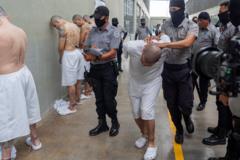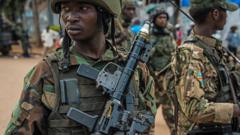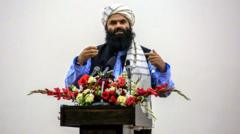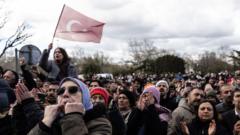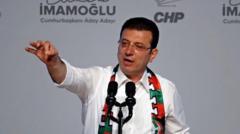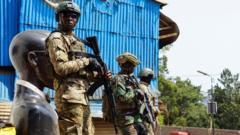The Democratic Republic of Congo has commuted the death sentences of three American citizens convicted in a coup attempt, ahead of a visit by a senior U.S. advisor, raising questions about potential future diplomatic efforts.
Americans' Death Sentences Overturned in DR Congo Coup Case

Americans' Death Sentences Overturned in DR Congo Coup Case
Three U.S. citizens sentenced to death for a failed coup attempt in the DR Congo have had their sentences commuted to life imprisonment amid diplomatic talks.
The presidency of the Democratic Republic of Congo has recently announced that death sentences for three Americans convicted in connection to a failed coup last year have been commuted to life imprisonment. The individuals, identified as Marcel Malanga Malu, Tylor Thomson, and Zalman Polun Benjamin, were initially sentenced to death by a military court along with 34 other defendants after a coup attempt targeting the presidential palace and an associate of President Félix Tshisekedi in May.
This decision to commute the sentences comes at a strategic time, coinciding with a visit to DR Congo from the newly appointed U.S. senior advisor for Africa, Massad Boulos. Expected to arrive in Kinshasa on Thursday before visiting Rwanda, Kenya, and Uganda, Boulos has ties to prominent figures in U.S. politics, though the U.S. government has not officially classified the three Americans as wrongfully detained in Congo.
The trio faced multiple charges, including criminal conspiracy and terrorism, all of which they have denied. The attack, which resulted in the death of Christian Malanga, the alleged leader of the coup, and five others, has drawn significant international scrutiny.
During the extensive trial process, a total of 51 individuals were processed by the military court, with hearings broadcasted publicly. While 14 were acquitted, the court's actions raised concerns around due process and military judicial proceedings. Notably, the imposition of death sentences has been largely dormant in DR Congo, with the last executions occurring around two decades ago.
After signing the commutation order, President Tshisekedi's spokesperson indicated that the president's action was an act of "individual clemency" for the three Americans. Observers suggest that this move indicates potential shifts in the geopolitical landscape, particularly regarding U.S.-Congo relations. Legal representatives for the Americans have expressed cautious optimism, referring to the commutation as a "first step" towards positive change.
The uncertain fate of other defendants, including persons of varying nationalities, remains ambiguous as discussions around sentencing continue. The military coup attempt itself began early on May 19, with armed assailants reportedly targeting key political figures, escalating tensions within the country.



